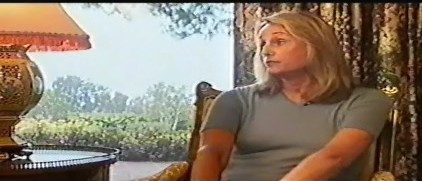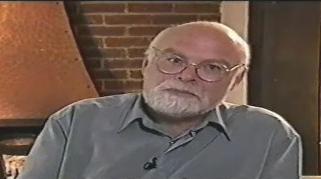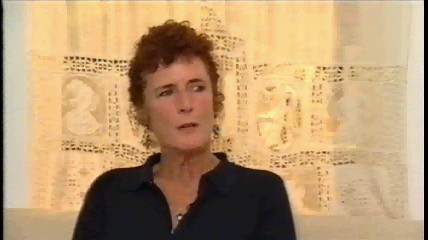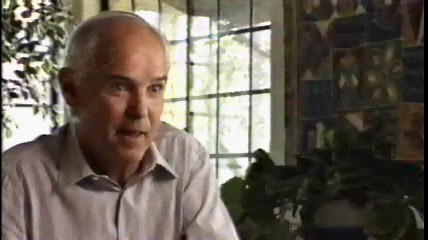Indianness
But he was becoming increasingly aware of the need to separate Knowledge from it's Indian cultural packaging.
Too many things that were simply a part of Indian culture had been considered incorrecly by Westerners to be an integral part of what Maharaji was offering. |
 |
"We brought a lot of Indian attachments with us, you know, we, we thought that because India, uh, Knowledge came from India
we had to adapt some of the Indian things, and that somehow our Western way wasn't quite good enough."
Well I didn't ever see any Divine Light Mission girl in a sari but at least Ms Collier is telling the truth about herself, if nobody else.
But, you did look so hot dressed in Indian gear, Sandy and you look a lot more joyful then than you ever did in this video, well James looked joyful. |
 |
"Mahatmas came to give Knowledge, it was a way of spreading Knowledge. In the ashrams then I found were um a way of disciplining yourself, your life, in terms of practising Knowledge.
Unfortunately we held on to the Indianess of it instead of the real practise of Knowledge, you know and incorporating that properly into our lives."
|
 |
"I did a talk once at a Young Conservative Association I was invited it to it because my cousin
was engaged to the president of the Young Conservatives at this particular town and he was interested and he invited me to give a talk
so I did and it was very successful and they all thought 'Well we'd like this.' So they asked where, how they could go further.
And I told them where the nearest ashram was and next Friday there will be a meeting there and they went there but very few people turned
up after that. The week after that about 30 people went to the ashram that night but the week after only about 3 went, (sniggers)
and the week after that none went (pause) because they came across that white sari brigade."
|  |
"I didn't, I wasn't fascinated with the whole Indian culture, that's why when I first went to hear him
speak and I saw these women in saris, I thought, Oh I don't want to have to wear a sari! I mean do I have to do that to listen to him
and to be in this company and to receive Knowledge because I didn't want to do that."
Linda Pascotto, President of the Prem Rawat Foundation |
 |
"Maharaji always said right from the very beginnin' he had no intention to create a religion and it seems to me right from day one
he's resisted any attempts, oagh, you know to try and make a religion around him. Urgh, you know and whenever anybody, seems to me, throughout his life,
whenever we've attempted to build any box around him he's always broken out of it and when he breaks out of it there are some people who prefer to be in the box."
It seems hard to believe that a Professor of Religious Studies can be so naive. Cult leaders, even young ignorant ones, who head religions
all say they're not starting a religion. They all say they have the true knowledge or in this case, Knowledge. What sounds more likely?
Every time Rawat tells new blatant lies and makes's another foolish mistake, some of his followers become disenchanted and disgruntled
and stop believing in him or your box metaphor in which only people who accept any and all rubbish from this one of the many
Perfect Master wannabes keep making boxes he's got to break out of? |
 |
For some people the changes that needed to take place were confonting. They had become attached to a lifestyle
they associated with Maharaji and Knowledge that was based on Indian tradition |
 |
"I had friends who lived in the ashram, um, who stopped practising when the ashrams closed. They felt betrayed, abandoned." |
 |
"And it was difficult, it was challenging for Maharaji. It was challenging for everyone. But he, umm,
I think that was the time where he really saw that it was really important to separate the um Indian interpretation
of everything so that we could have a fresh start and and be authentic with ourselves."
Isn't it a little late to start being authentic after 15 years of practising this "Knowledge"? |
 |
"He undertook the challenge to get rid of the, the fluff, the conceptions that might have attracted people that in fact
some people loved more than they loved the real thing and that left people with a choice. Do I love my quote religion, my Maharaji
religion or do I love my actual recognition, my actual understanding, what I've seen and experienced and some people said 'No,
I'll take my religion, thank you very much'. (snigger, snigger, snigger) God (under his breath) and some said this is real enough for me that
I'm going to stay with it." |
 |
As people came forward wanting to help Maharaji, organisations sprang up dedicated to promoting his teaching.
Maharaji often found that they had difficulty understanding how best to support such a unique endeavour.
|
 |
"His ability to keep true to himself, to resist the pulls of organisations that wanted to do things the worldly way.
I know one person who was a who was the most responsible position in the organisation coming to me to say 'Help me persuade
Maharaji to charge for Knowledge', (rapidly shakes his head up and down) to charge money for it and he made a concerted effort
to this would be much better as a business so we should make it a business and you know Maharaji totally rejected anythign that would
any external influence that would compromise the integrity of his message and what he ahs to offer."
|  |
"The organisation at certain times become the second Mata Ji. Try to control him but those organisations doesn't have the
purpose to organise him. Their purpose is, their purpose is very simple to organise his message to be conveyed properly.
But what message shold it be, it had to come through him.
|  |
|